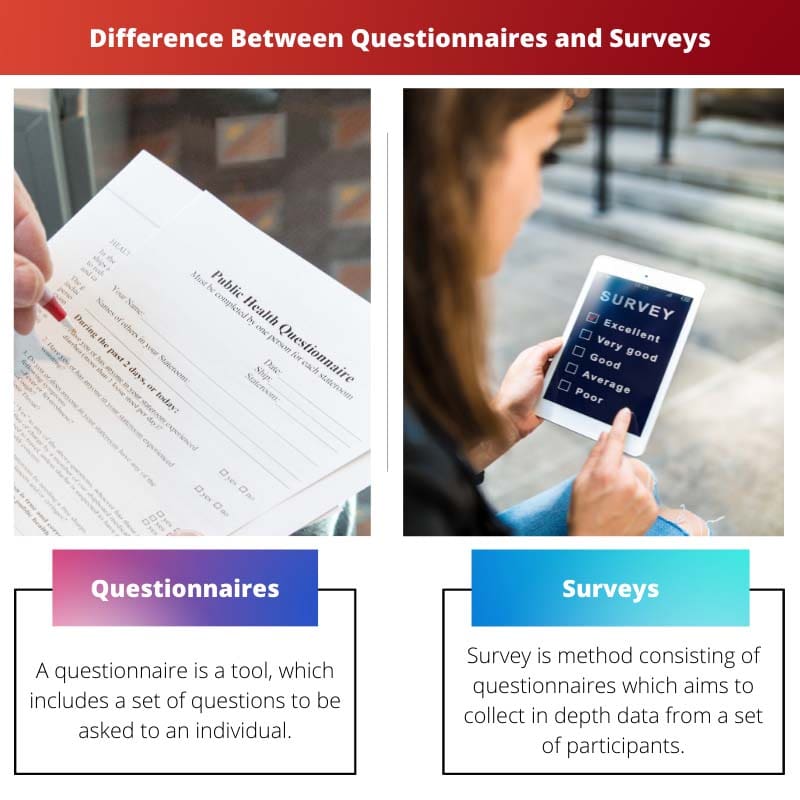Questionnaire and Surveys are the two terms that are mixed up when used. This is due to people thinking of them as the same thing when they are totally different concepts.
When doing any research, one must always know the difference between these two to be more likely to obtain information successfully.
Key Takeaways
- Questionnaires are a data collection tool, while surveys are a method of gathering information using questionnaires.
- Questionnaires contain questions, while surveys involve administering those questions to a sample of respondents.
- Surveys provide an overview of opinions or behaviors, while questionnaires are used to collect that data.
Questionnaires vs Surveys
Questionnaires are structured sets of questions that are administered to individuals either in person, by mail, or online. Surveys are a broader term that encompasses a range of research methods used to gather data from a sample of individuals and can be conducted in a variety of formats.

A questionnaire is a tool used while doing research, which includes a set of questions meant to collect data from a participant.
These questionnaires are a mixture of open-ended and close-ended questions. They require less time consumption, and usually, the answers are confined.
A survey is a research method used to collect information from a prearranged set of participants to obtain more insights about their particular topic.
A researcher can use many types of surveys considering the methodology chosen. Surveys let the candidates elaborate on their answers as there is no pre-arranged set of options to choose from.
Comparison Table
| Parameters of Comparison | Questionnaires | Surveys |
|---|---|---|
| Definition | A questionnaire is a tool, which includes a set of questions to be asked to an individual. | Survey is method consisting of questionnaires which aims to collect in depth data from a set of participants. |
| Types of questions | Both close-ended and open-ended questions are asked. | Few open-ended and close-ended questions are asked. |
| Time spent | Quick to collect data. | Process is time consuming. |
| Conducted for | Questionnaires are used for collecting data on a topic. | Surveys are done to conduct in depth research or study a topic. |
| Types of answers | Objective answers. | Answers can be subjective as well as objective. |
What are Questionnaires?
A questionnaire is a research tool that includes a set of questions that tend to obtain data from a participant. These questionnaires are a mixture of open-ended questions and close-ended questions.
Open-ended or the long form questions let the participant elaborate their thoughts in depth. The Statistical Society of London developed a research questionnaire in the year 1838.
The information obtained from a questionnaire can be quantitative and qualitative.
Often, questionnaires may be a part of a survey, but a survey compulsorily has questionnaires as a part. With a good set of questionnaire questions, a lot of information can be arranged with less time consumption.
In questionnaires, there are always fewer biases as the questions are prearranged. Participants get to be anonymous if they want and still answer the questions with the same efficiency.
Qualitative questionnaires are used to conduct a fact-finding investigation which helps approve or disapprove a given hypothesis.
On the other hand, quantitative questionnaires are used to examine a hypothesis which has been created previously. Questionnaires are collected in four ways, including online questionnaires, where a Google form is circulated.
Telephone questionnaires, where the researcher calls the participants to chat quickly and collect their responses.
The researcher, in some cases, visits the participants to obtain their answers, this type is known as an in-house questionnaire.
And the last one is mail questionnaires, where an email consists of some questionnaires meant to be answered by the participant.

What are Surveys?
A survey is a method used while doing research that helps the researcher gather data from a pre-arranged group of candidates to acquire in-depth insight about a particular topic or study.
Surveys can be done in many ways considering the methodology that has been chosen.
Since 2020, research has been given extreme importance, and therefore it is necessary to know the advantages of doing the right survey for research.
The information is arranged with structured processes and procedures, which ensure that every individual candidate gets to answer the questions in an unbiased way to avoid any circumstances that could affect the research results.
There are many different ways for surveys to be carried out. The most common methods for doing surveys are emails, where an email is sent to some targeted group of people to collect data.
Another way is embedding the website, which makes the participant number very high.
Posting on social media platforms is also a very effective way to get the maximum number of people and get their responses.
Other than all these methods, survey data can be collected using the QuestionPro App, and even Sms is a great and easy way to collect mass data quickly.

Main Differences Between Questionnaires and Surveys
- Surveys collect, analyse and interpret information, while questionnaires are pre-arranged questions.
- A survey is referred to as the process of collecting data, and a questionnaire is a tool.
- A survey requires a lot of time, while a questionnaire method of data collection is a quick process.
- Surveys are conducted on targeted audiences, while questionnaires are given to pre-arranged candidates.
- Survey answers are subjective and objective, while the questionnaire is objective.

The distinction between questionnaires and surveys is overlooked. This article effectively highlights the characteristic features of each method.
The article effectively outlines the key differences between questionnaires and surveys, providing a detailed understanding of their distinct roles in research.
I appreciate the detailed description of qualitative and quantitative questionnaires, as well as the various methods of conducting surveys. This provides a comprehensive understanding of research methodologies.
The application of questionnaires in different forms and the use of surveys in contemporary contexts are well explained.
The comparison drawn between questionnaires and surveys effectively highlights their specific characteristics. Well-written article!
The application of questionnaires and surveys in different types of data collection is effectively articulated in this article. The examples of various survey methods are particularly insightful.
The historical context of questionnaires and surveys is an interesting addition to the explanation. The references provided also enhance the informative value of this article.
The article provides a clear distinction between questionnaires and surveys, and the applications of each method. It’s a valuable resource for understanding research methodologies.
The comprehensive explanation of questionnaires and surveys, along with their differences, is very enlightening. The importance of each method in the context of research is well emphasized.
Thank you for clarifying the differences between questionnaires and surveys and the importance of understanding them. I also appreciate the detailed explanation of how questionnaires are used and the different ways in which surveys can be conducted.
I agree with you, this article is very insightful and provides a thorough understanding of the concepts.
The comparison table is particularly helpful in illustrating the differences. Great post!